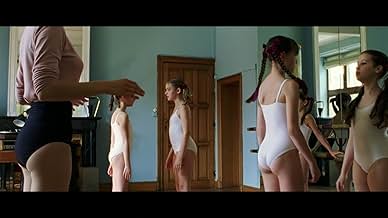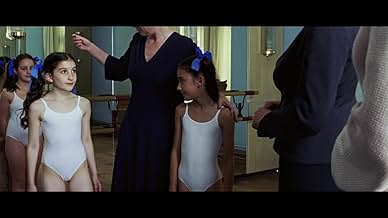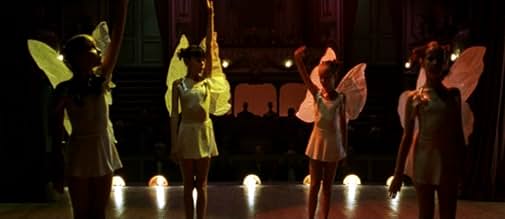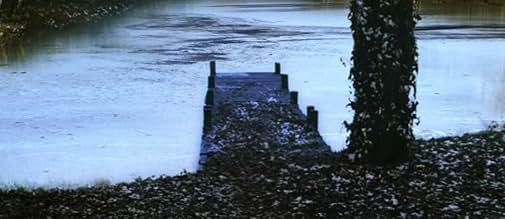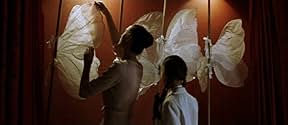VALUTAZIONE IMDb
6,8/10
6789
LA TUA VALUTAZIONE
Uno sguardo all'interno di un insolito collegio per ragazze.Uno sguardo all'interno di un insolito collegio per ragazze.Uno sguardo all'interno di un insolito collegio per ragazze.
- Regia
- Sceneggiatura
- Star
- Premi
- 8 vittorie e 2 candidature totali
Recensioni in evidenza
Offbeat? This film is so far removed from offbeat, that previous films described as offbeat are marching in military step unison. Innocence is a gorgeous composition of thought, sound and beauty which is utterly compelling to watch but challenges the viewing audience to a hard fought internal battle, raising questions within the viewer, in a William Blake-ish "Songs Of Innocence, Songs Of Experience" manner.
Undoubtedly the cinematography is some of the most striking that has been put to film certainly this side of the millennium, as Hadzihalilovic manages to compose wonderful shots of serene beauty within a hidden sense of malice and darkness. His symbolic use of colours is highly key to the understanding of the events, themes and emotions and aids the viewer immensely in being able to 'try' (and I emphasis the word) and dissect the layers of thought provoking connotations on the nature of innocence.
It's not always the most comfortable film to be viewing, as certain IMDb reviewers would hasten to claim it has "pedophilic tendencies", but I fear they're somewhat missing the point of the entire film; yes it is often at times difficult to view, but there is a purpose. William Blakes collection of poems on innocence and experience charts the replacing of the former with the latter. He shows us how innocence cannot be appreciated til you are experienced, but how experience completely taints any notion of innocence, and the same is with this precise film. These unsettling moments for us are only so because of the experience which we possess and have learnt throughout our existence, to the girls they don't see the same sins, pitfalls and traps we do, to them they are merely acting on instinct, as children do, in an innocent, cares- of the world-free way.
Thus the film charts the fall of innocence from the elder girls at the hauntingly constructed boarding school, and the continuing of the cycle through metamorphic symbolism, the circle of young life. Although it does make me question the use of the word "film". If I had but one criticism of the film, for all its mesmerising viewing and original premise it comes across more as a case study in innocence rather than a fully fledged story. While undeniably engaging and engrossing it lacks a certain spark, becoming more concerned with the ideas than the progression of any one story, to the extent where the ideas will be ringing in your head for days afterwards, but lacking a sense of resolution. Innocence would be an impressive debut solely on the basis of bravery alone for tackling such a notion, and so effectively, but the hallmarking of this 'case study' comes in the directors striking use of colours, symbolism and cinematography which I personally believe to have been unsurpassed in the films I've seen of recent years. Although you have been warned, the film is an intense experience which will not set well with everyone, but given that you have now been warned, so it's not as if you can claim you were innocent of that.
Undoubtedly the cinematography is some of the most striking that has been put to film certainly this side of the millennium, as Hadzihalilovic manages to compose wonderful shots of serene beauty within a hidden sense of malice and darkness. His symbolic use of colours is highly key to the understanding of the events, themes and emotions and aids the viewer immensely in being able to 'try' (and I emphasis the word) and dissect the layers of thought provoking connotations on the nature of innocence.
It's not always the most comfortable film to be viewing, as certain IMDb reviewers would hasten to claim it has "pedophilic tendencies", but I fear they're somewhat missing the point of the entire film; yes it is often at times difficult to view, but there is a purpose. William Blakes collection of poems on innocence and experience charts the replacing of the former with the latter. He shows us how innocence cannot be appreciated til you are experienced, but how experience completely taints any notion of innocence, and the same is with this precise film. These unsettling moments for us are only so because of the experience which we possess and have learnt throughout our existence, to the girls they don't see the same sins, pitfalls and traps we do, to them they are merely acting on instinct, as children do, in an innocent, cares- of the world-free way.
Thus the film charts the fall of innocence from the elder girls at the hauntingly constructed boarding school, and the continuing of the cycle through metamorphic symbolism, the circle of young life. Although it does make me question the use of the word "film". If I had but one criticism of the film, for all its mesmerising viewing and original premise it comes across more as a case study in innocence rather than a fully fledged story. While undeniably engaging and engrossing it lacks a certain spark, becoming more concerned with the ideas than the progression of any one story, to the extent where the ideas will be ringing in your head for days afterwards, but lacking a sense of resolution. Innocence would be an impressive debut solely on the basis of bravery alone for tackling such a notion, and so effectively, but the hallmarking of this 'case study' comes in the directors striking use of colours, symbolism and cinematography which I personally believe to have been unsurpassed in the films I've seen of recent years. Although you have been warned, the film is an intense experience which will not set well with everyone, but given that you have now been warned, so it's not as if you can claim you were innocent of that.
Those who expect a straightforward plot with all the answers from Innocence will be disappointed. However, this "open for interpretation" is the strength of the film. This personal interpretation without doubt varies whether the viewer is male or female, child or an adult. Obviously a film about young girls opens differently to women/girls, who can possibly feel similarity with the characters, than to a male viewer who watches the set from the outside - from the darkened audience.
Personally, I saw the film as a demonstration how alien is the world of grown ups to children and how unexplainable many things remain. The film that is clearly shot from the viewpoint of the children and does not tell us much of the environment - answer the basic questions of what and why. Just as children are - and especially were - uninformed about the decisions concerning their life made by their parents/teachers/etc.
Technically the film is very well made, especially the lake shots where camera hovered just centimetres above the surface made me almost feel the water. Also the young actresses performed exceedingly well and felt very natural in their roles.
Personally, I saw the film as a demonstration how alien is the world of grown ups to children and how unexplainable many things remain. The film that is clearly shot from the viewpoint of the children and does not tell us much of the environment - answer the basic questions of what and why. Just as children are - and especially were - uninformed about the decisions concerning their life made by their parents/teachers/etc.
Technically the film is very well made, especially the lake shots where camera hovered just centimetres above the surface made me almost feel the water. Also the young actresses performed exceedingly well and felt very natural in their roles.
10o_cubitt
Innocence is an extraordinary film that explores its theme with such determined rigor one cannot help but be compelled and shocked by every moment. Innocence explores the period in girls' lives before they lose their Innocence and start adulthood. The mysterious school to which we are introduced through Tarkovskyesque images of flowing water becomes a dark and at times haunting manifestation of both the young girls' enforced Innocence as well as the setting for the film's mystery narrative in which we find ourselves desperate to see through the schools wooded grounds to some kind of epiphany.
Part of the success of Innocence is that it is able to confuse the viewer and forces the audience to confront their own ideas of Innocence and how we as adults should view images of Innocence. Images of the young girls at play should be easier to watch but this is an adult film with a predominately adult audience and the darkness of the films own geography plays with ones ideas of Innocence and the loss of it.
Extraordinary images, extraordinary performances, a great film.
Part of the success of Innocence is that it is able to confuse the viewer and forces the audience to confront their own ideas of Innocence and how we as adults should view images of Innocence. Images of the young girls at play should be easier to watch but this is an adult film with a predominately adult audience and the darkness of the films own geography plays with ones ideas of Innocence and the loss of it.
Extraordinary images, extraordinary performances, a great film.
There can't be many films that occupy your mind for many days afterwards, make you read the book they are based on, and then watch them again.
"Innocence" is one of those films and it is both beautiful and intriguing at the same time. It is based on a book by Frank Wedekind called "Mine-Haha or the corporeal education of girls", the only published fragment of his unfinished novel "Hildalla". It was first published in 1901 and although beautifully written it has much darker undertones than the film with references to a body cult of youth and natural beauty which would later become exploited by Nazi culture.
The film is very much a metaphor for a childhood world which is in many ways separate but also protected from that of adults. It plays in an isolated Girls School their children enter at the time when they start to make their own independent experiences of the world around them and ends with the onset of puberty and attainment of menarche, both symbolising the emotional and physical end of childhood. The cinematography is beautiful and reminded me in many ways of Tarkovsky with its symbolism and haunting images. However, the story can seem a little simplistic and linear times and often appears to demand more depth from the young child actors than they could possibly deliver.
Nevertheless this is a very interesting and thought-provoking film and well worth watching. The French dialogue often has a musical quality and as long as you're prepared to watch this in a calm and unhurried state of mind this is very rewarding and unusual cinematic experience.
"Innocence" is one of those films and it is both beautiful and intriguing at the same time. It is based on a book by Frank Wedekind called "Mine-Haha or the corporeal education of girls", the only published fragment of his unfinished novel "Hildalla". It was first published in 1901 and although beautifully written it has much darker undertones than the film with references to a body cult of youth and natural beauty which would later become exploited by Nazi culture.
The film is very much a metaphor for a childhood world which is in many ways separate but also protected from that of adults. It plays in an isolated Girls School their children enter at the time when they start to make their own independent experiences of the world around them and ends with the onset of puberty and attainment of menarche, both symbolising the emotional and physical end of childhood. The cinematography is beautiful and reminded me in many ways of Tarkovsky with its symbolism and haunting images. However, the story can seem a little simplistic and linear times and often appears to demand more depth from the young child actors than they could possibly deliver.
Nevertheless this is a very interesting and thought-provoking film and well worth watching. The French dialogue often has a musical quality and as long as you're prepared to watch this in a calm and unhurried state of mind this is very rewarding and unusual cinematic experience.
If you've ever read the work of German symbolist writer Frank Wedekind then you may already have an idea about how difficult a text first feature writer-director Lucile Hadzihalilovic chose to adapt and execute. But execute she does for a good portion of the film until the rather obvious over-the-top conclusion that fails to answer many of the questions raised earlier.
That said, there is much to enjoy this film mainly due to its excellent cinemascope photography and the whole idea of an idyllic place where prepubescent girls are trained to be ballet dancers in order to enter the world as proper teenage women.
Since this is a symbolist writing, one can also entertain thoughts of purgatory (the characters are brought into being via a coffin), isolated same-sex societies (with one old man that is never explained), or some of the themes M. Night Shymalan explored in "The Village" with fear being used to keep a small population under control.
In any case, this film will provoke much discussion afterwards so bring your most knowledgeable cinema pals and dig in. Young girls in white outfits giggling and playing for two hours may not be everyone's simplification of the world at large, but in some ways it does sum up the dangers of segregated societies.
Not bad for a first film with extremely difficult material. A remarkable debut nonetheless.
That said, there is much to enjoy this film mainly due to its excellent cinemascope photography and the whole idea of an idyllic place where prepubescent girls are trained to be ballet dancers in order to enter the world as proper teenage women.
Since this is a symbolist writing, one can also entertain thoughts of purgatory (the characters are brought into being via a coffin), isolated same-sex societies (with one old man that is never explained), or some of the themes M. Night Shymalan explored in "The Village" with fear being used to keep a small population under control.
In any case, this film will provoke much discussion afterwards so bring your most knowledgeable cinema pals and dig in. Young girls in white outfits giggling and playing for two hours may not be everyone's simplification of the world at large, but in some ways it does sum up the dangers of segregated societies.
Not bad for a first film with extremely difficult material. A remarkable debut nonetheless.
Lo sapevi?
- QuizIn the 'extras' on the DVD release, the director relates that children playing unsupervised in nature (the forest, the pond) is a 'freeing' setting for them, an 'uncontrolled' environment to explore. Water is very important, as it is a highly visible medium in its many forms (including within or from underneath a surface), and it is necessary, sensual, and enjoyable, but also dangerous (the drowning), and evokes many emotions. Flowing water can also symbolize the passage of time. The dynamic of children relating to adults, not understating them or their actions, while seeing them as role models, is another dichotomy the director wanted to emphasize. Ambiguity and a 'dream-like' quality are also important elements of the film. She states they digitally enhanced or 'tweaked' colors in the film to 'non-realistic' tones, to achieve mood and lighting effect, particularly day for night shots. The director says she is not interested in explaining meaning: "... what I like in cinema is being lost. I like films I don't completely understand, so they stay with me longer after they're over," and, "I believe everyone can find their own stories within the film."
- BlooperWhen Bianca says goodbye to all the girls there is snow in the alley and they are all outside dressed with bare arms and bare legs. Then Bianca runs away in pouring rain. No more snow on the ground.
- Curiosità sui creditiThe entire set of credits is shown at the opening of the movie.
- ConnessioniFeatured in Women Make Film: A New Road Movie Through Cinema (2018)
- Colonne sonoreOrchestral Suite from La Petite Renard Rusée
Composed by Leos Janácek
Libretto by Rudolf Tesnohlídek
Performed by Czech Philharmonic (as The Czech Philharmonic)
Conducted by Vaclav Talich
I più visti
Accedi per valutare e creare un elenco di titoli salvati per ottenere consigli personalizzati
- How long is Innocence?Powered by Alexa
Dettagli
- Data di uscita
- Paesi di origine
- Lingua
- Celebre anche come
- Невинність
- Luoghi delle riprese
- Parc du Cinquantenaire, Bruxelles, Belgio(walking to new school)
- Aziende produttrici
- Vedi altri crediti dell’azienda su IMDbPro
- Tempo di esecuzione
- 2h 2min(122 min)
- Colore
- Mix di suoni
- Proporzioni
- 2.35 : 1
Contribuisci a questa pagina
Suggerisci una modifica o aggiungi i contenuti mancanti


